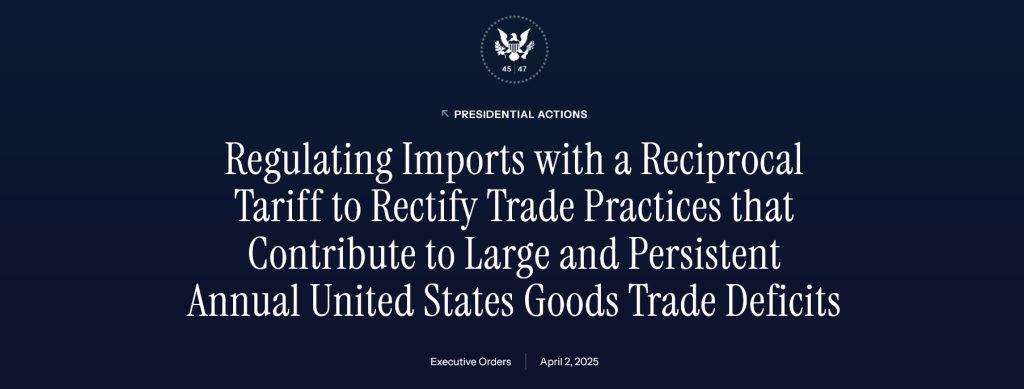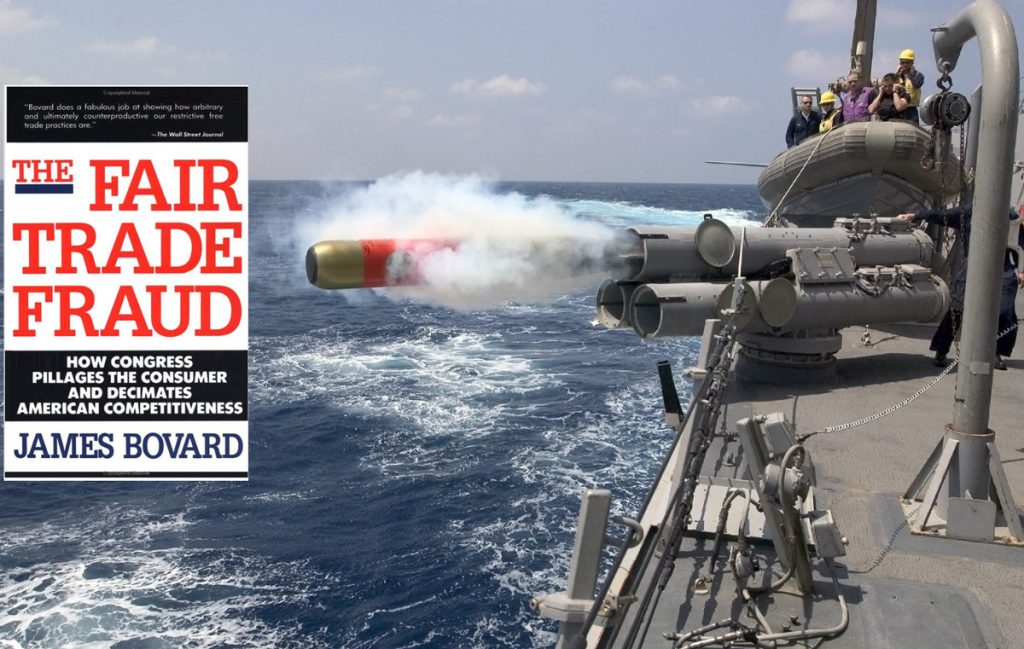Trump’s “Fair Trade” Offal
by James Bovard, April 10, 2025
“For decades, our country has been looted, pillaged, raped, and plundered by nations near and far, both friend and foe alike,” President Trump declared last week when he proclaimed a national emergency and imposed the highest tariffs since the Smoot-Hawley Act of 1930. US stock markets lost more than $6 trillion in value and fierce controversies are raging over whether Trump is rescuing or ruining the economy. But the new U.S. tariff regime is a glorious success because “these countries are calling us up, kissing my ass,” President Trump boasted on Tuesday evening.
Commerce Secretary Howard Lutnick said Trump’s penalty tariffs are “the reordering of fair trade.” Secretary of Treasury Scott Bessent declared, “For the first time in decades — probably since I was a college student — we’re going to see fair trade.”
Last week, the US Trade Representative (USTR) released its 377-page annual report on Foreign Trade Barriers, exhaustively recapping abuses by each nation cheating America. Luckily for the Trump administration, media fact checkers almost completely ignored the wildly-slanted report.
But one of the most high-profile cases illustrates the absurdity of Trump’s latest fair trade definitions.
USTR stated that most “US exports to Vietnam face tariffs of 15 percent or less.” But in the Rose Garden ceremony, Trump touted a chart stating that Vietnam’s “Tariffs Charged to U.S.A.” was 90 percent. Trump set penalty tariffs at only half the assessed tariff on the US because he wanted to be “kind”; Vietnam’s exports were kindly walloped with a 46 percent tariff. Trump declared that each nation’s tariff was based on “the combined rate of all their tariffs, non-monetary barriers and other forms of cheating.”
Last Friday, Trump announced that he had spoken with the General Secretary of the Communist Party of Vietnam and Vietnam “wants to cut their tariffs down to ZERO if they are able to make an agreement with the US.” But Peter Navarro—Trump’s top trade adviser—scoffed at the offer: “When they come to us and say, we’ll go to zero tariffs, that means nothing to us, because it’s the non-tariff cheating that matters.”
And what are the supposedly outrageous Vietnamese non-tariff barriers? The USTR report castigated Vietnam for its refusal to import “second hand consumer goods; used parts for vehicles; used internal combustion engines of less than 30 horsepower…and refurbished medical devices.” Does the Trump administration actually believe it can close the trade deficit with Vietnam by shipping them our used lawn mowers, rattletrap transmissions for old Fords, and leftover syringes?
Ethanol supposedly exemplifies Vietnamese unfair trade barriers. USTR complained that Vietnam “only allows blends of 5 percent ethanol in one of its three grades of gasoline.” The US government is pressuring Vietnam for “the eventual migration to a 10 percent ethanol blend.” Ethanol is a poor source of fuel compared to gasoline and it pollutes the air. Ethanol is notorious for damaging car engines in this nation.
But the US has plenty of ethanol to export because its production has been heavily subsidized since the 1970s. Last week, the Trump administration announced $537 million in new subsidies for biofuels production. But browbeating Vietnam to purchase more ethanol subsidized by the US government is a victory for fair trade because God wants Iowa corn farmers to be rich. Condemning foreigners for not purchasing exports subsidized by the US government epitomizes the hypocrisy of Trump-style fair trade.
The Trump administration is also indignant that Vietnam bans US “white offal,” including “poultry gizzards and beef and pork stomach and intestines.” The US government insists that Vietnam lacks a “science-based justification for not approving new US facilities seeking to export offals.” Offals can be contaminated by Salmonella, mycotoxins, parasites, and heavy metals.
The US government offal enthusiasm doesn’t extend to haggis, the traditional Scottish dish which has been banned from import since 1971. Haggis relies on sheep lungs, which the US Department of Agriculture considers a high risk of spreading food-borne illnesses.
But even if Vietnam bought all the used lawn mowers and all the butcher shop leftovers in America, there would likely still be a big trade deficit between the two nations. The Trump penalty tariffs were largely derived from a simplistic formula that took “the trade deficit that America runs with that nation and dividing it by the exports that country sent” to the US, as the New York Times explained.
A Trump administration official declared that the penalty tariffs were “based on the concept that the trade deficit that we have with any given country is the sum of all unfair trade practices, the sum of all cheating.” Regrettably, the administration has provided no evidence to buttress that assertion. Trump declared on Sunday that as long as trade deficits persist, so, too, will the penalty tariffs.
Basing penalty tariffs on trade flow data is like a federal judge sentencing a criminal based on the weight of the defendant, not on the actual offense he committed. But it doesn’t matter if Trump’s proclamations have zero intellectual or moral credibility. His declaration of an emergency sufficed to vastly increase his arbitrary power over the American economy.
Trump’s decrees vivify how “fair trade” means a moral canonization of pure political arbitrariness. The ultimate basis is that fair trade is whatever politicians say it is—at least until they revise the definition of fairness. Will Trump explain why making foreign trade totally dependent on presidential decrees is a triumph of fairness?
On Sunday evening, Trump proclaimed: “Some day people will realize that Tariffs, for the United States of America, are a very beautiful thing!” How much will Americans be forced to pay for Trump’s tariff salvation scheme? Never forget Sen. James Beck’s 1884 warning: “The tariff is the protection the wolf gave the lamb.”



Comments are closed.